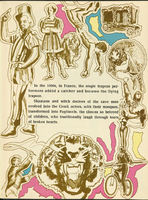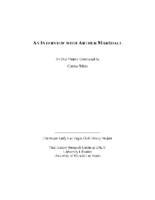Search the Special Collections and Archives Portal
Search Results

Leaflet of coming attractions at the Sands Hotel and Casino, late 1960s - early 1970s
Date
Archival Collection
Description
Blue paper leaflet showcasing Jack Entratter's guest lineup for The Copa Room and The Celebrity Theatre at the Sands Hotel in Las Vegas, Nevada. Guest appearances include Alan King, Jerry Lewis, Dean Martin, Sammy Davis, Jr., Dan Rowan, Dick Martin, Louis Prima, Righteous Brothers, and Buddy Greco.
Text

Transcript of interview with Steven and Wendy Hart by Barbara Tabach, October 23, 2014
Date
Archival Collection
Description
Steven Hart was born on April 7, 1946, and moved to Las Vegas as a one-year-old with his parents Nat and Sylvia Hart. After graduating from Las Vegas High School, Steven Hart went through an apprenticeship program to become a journeyman carpenter as his father wanted him to learn all phases of the hotel, restaurant, gaming, and business. Including hot to build and design them. He then enlisted in the United States Navy and joined its construction battalion during the Vietnam War. Upon his return to Las Vegas, Steven followed in his father?s footsteps working in the casino industry. Nat Hart was one of the city?s original celebrity chefs and corporate vice president of food and beverage for Caesars World. Well-known for his restaurants at Caesars Palace and the Desert Inn, and for his popular gourmet cooking school. During his long career as a successful gaming executive, Steven worked at several properties, including the International Hotel as food and beverage controller. He was the vice president of food and beverage for the Del Web Corporation. The assistant corporate food and beverage director at the Argent Corporation as well as the Casino Credit executive and Junket Representative for Caesars World. He worked as executive casino host at Bills Gamblin Hall and Hotel in addition to working as the hotel gaming consultant with Hart Gaming LLC. Steve?s wife and dad also owned Kazuku Yakitori, Ichi Ban Japanese steak house, Ringside Bar and Grill and the World Boxing Hall of Champions Museum. In 1985, Steven married Texas-born Wendy Stark Hart, who is also present during this oral history interview. Wendy Hart also pursued a career as an executive in the food and beverage industry. Together, Steven and Wendy Hat reflect at length about Nat Hart?s successful career, particularly as longtime corporate vice president of food and beverage for Caesars World Inc., and opening many of the company's restaurants at Caesars Palace locally and in Atlantic City. Steve and his dad also put in many restaurants for many of the Las Vegas Strip hotels. They discuss both Nat?s relationships with infamous industry figures, like Frank Rosenthal and Hy Goldbaum, and Nat?s dining endeavors with other industry leaders such as like Kirk Kerkorian and Stu and Cliff Pearman. They also highlight the innovation and creativity that Nat brought to his work. Steven also talks about his own career path, from working small jobs at the hotels while in high school, to his military service and developing construction skills, to learning various aspects of the gaming industry management. He reminisces about his childhood in Las Vegas and involvement with Jewish community, including being the first bar mitzvah at Temple Beth Sholom and later serving as president of Jewish War Veterans, Post 711.
Text

Transcript of interview with Herb Tobman by Deborah Fischer, March 13, 1981
Date
Archival Collection
Description
Interview with Herb Tobman by Deborah Fischer on March 13, 1981. In this interview on the subject of gambling, Herb Tobman talks about moving to Las Vegas while working for Standard Oil as a tire, battery and accessory salesman, then began working for the Moulin Rouge as the general manager in 1955. He gives a description of the hotels on Las Vegas Boulevard and downtown, and the "western" nature of town where people rode horses. Tobman then discusses the types of gambling that were popular: slot machines, blackjack and craps. He also talks about the accommodations (hotels and motels) available in the 1950s, transportation to and from the area, entertainment, and the economy. The interviewer continually asks Tobman to compare 1950s Las Vegas with 1980s Las Vegas in terms of the gambling environment.
Text

Souvenir program and guide for Circus Circus, 1971
Date
Archival Collection
Description
The souvenir guide and program to Circus Circus features descriptions of the entertainment acts performing at the hotel/casino.
Text

Transcript from interview with Mike Unger by Barbara Tabach, January 21, 2016
Date
Archival Collection
Description
In this interview, Unger reflects upon his long and successful career in hotel management in Las Vegas and also in Arizona and Pennsylvania. He shares stories as a local celebrity, particularly in the 1970s and 1980s when he worked at Caesars Palace, as well as the big projects he oversaw, including organizing the first big fight nights, World Series of Tavern Poker and Grand Prix race. He talks about working with Morris Shenker, Moe Dalitz, Cliff Perlman and Billy Weinberger, and the role of the Jewish community in the city, and specifically in the gaming industry. Unger also discusses his non-gaming industry ventures which have included a satellite communications business and a bagel business.
Mike Unger was born in Queens, New York in 1947, and spent most of his childhood in Long Island, growing up in a predominantly Jewish and Italian community. As a young adult, Unger was already working hard, running one of his family?s restaurant after school. When he was in high school, his family moved to Los Angeles to accommodate his father?s health needs, and eventually end up in Las Vegas by 1967. Over the next two decades, Unger would work at nine properties in the city. Unger is one of the University of Nevada, Las Vegas? first hotel management graduates, and started his career with Summa Corporation in its management training program at the Frontier Hotel and Casino. After a brief stint at the Airport Marina Hotel in Los Angeles in 1972, Unger returned to Las Vegas, serving in management capacities at the Aladdin Hotel and Casino, Summa Corporation headquarters and Landmark Hotel and Casino. In 1978, he joined Caesars Palace Hotel and Casino management team, and was integral in creating the city?s first large boxing events, the World Series of Tavern Pool, and the Grand Prix race. Unger also ran properties for the White Mountain Apache and Colorado River Indian Tribes in Arizona, as well as the Showboat Hotel and Casino. In this interview, Unger reflects upon his long and successful career in hotel management in Las Vegas and also in Arizona and Pennsylvania. He shares stories as a local celebrity, particularly in the 1970s and 1980s when he worked at Caesars Palace, as well as the big projects he oversaw, including organizing the first big fight nights, World Series of Tavern Poker and Grand Prix race. He talks about working with Morris Shenker, Moe Dalitz, Cliff Perlman and Billy Weinberger, and the role of the Jewish community in the city, and specifically in the gaming industry. Unger also discusses his non-gaming industry ventures which have included a satellite communications business and a bagel business.
Text

Transcript of interview with Jerry Engel by Barbara Tabach, March 1, 2016
Date
Archival Collection
Description
Jerry Engel was born in 1930 in New Jersey and spent most of his early life in Long Beach, New York until the family moved westward to Las Angeles. Jerry is a retired Certified Public Accountant and loves to talk about the history of Las Vegas that he observed since arriving in 1953. That was the year that he moved to Las Vegas to join his older brothers, Morris and Phil, in their accounting firm. Their major client at the time was Desert Inn. Another personal connection with local history: the Engel brothers? mother, Esther Katz Engel, was among the early investors in the Moulin Rouge hotel/casino enterprise. Jerry graduated with honors from University of California, Los Angeles in 1951. His accounting career in Las Vegas is highly regarded and he continues to maintain a consulting practice. He remains active within the community and enjoys doing presentations based on his memories of Las Vegas history. Within this interview, Jerry highlights people, casinos and other observations of local history that he came into contact with over the decades. He provides insights about the role of an accountant in the gaming industry. He also discusses the influence of Jewish business leaders in and array of local gaming and non-gaming issues, including the retail world, Jim Crow era segregation, and the astonishing growth of the valley over six decades.
Text
Audio clip from interview with Herb Tobman by Deborah Fischer, March 13, 1981
Date
Archival Collection
Description
Part of an interview with Herb Tobman on March 13, 1981. In this clip, Tobman discusses moving to Las Vegas, employment, and the gambling industry.
Sound

Transcript of interview with Walter Weiss by Claytee White, November 2, 2010
Date
Archival Collection
Description
In this interview, Walter Weiss discusses how Judaism and boxing kept him out of trouble in his youth. Weiss grew up in the Boston area, and started boxing as a teenager. Weiss talks about his boxing training, becoming a runner for a bookmaker, and coming to Las Vegas in the 1950s to be a bookmaker for the Stardust Hotel, and working the slot machine floor. He had several different jobs in various casinos, and discusses different people involved in the gaming industry in Las Vegas.
Walter Weiss life story begins in a Malden, Massachusetts during the Great Depression. His early background was a blend of observant Judaism, secularism, and the effects of the era. He was a troubled youth whose older brother encouraged him to join him in boxing. As Walter explains: I was a wild kid and ... boxing saved my life. His aptitude for boxing led him to be a sparring partner in New York City's famous Spillman Gym. There he met and worked out with some of the greatest fighters of the era, including Rocky Marciano. He recalls how he turned professional while attending the University of Miami and how he first came to Las Vegas in 1958 to escape his personal troubles and find work with a local bookmaker. Thus began his diverse employment history in the casino industry. He details his various positions and the cast of famous and infamous characters of the times. For six years he return to New York and worked as a Wall Street broker before arriving back in Las Vegas in 1973. He talks about his property ownership, lobbying for an amendment to Senate Bill 208, his personal religious changes and a sundry of observations about the changes that occurred as the state took over gaming.
Text

Transcript of interview with Arthur "Art" Marshall by Claytee D. White, February 11, 2014
Date
Archival Collection
Description
Interview with Arthur "Art" Marshall by Claytee White on February 11, 2014. In this interview, Marshall
Arthur Marshall was born in 1929 in Cleveland, Ohio. He met his wife, Jayn in 1953, and the couple moved to Las Vegas where she already lived with her family. Art joined his father-in-law in the family's retail clothing business. Art Marshall took over the retail clothing business with his brother-in-law, Herb Rousso, and expanded operations as Marshall-Rousso stores. Art quickly became very active in the Jewish community upon arriving in Las Vegas. He served as president at Temple Beth Sholom, and worked with other Jews in the city, many who owned and managed the hotels at the time, to build a strong Jewish community in Las Vegas. He served as the chairman of Nevada State Bank and spent 12 years on the Nevada Gaming Commission.
Text
Audio clip from interview with Steven and Wendy Hart, October 23, 2014
Date
Archival Collection
Description
Steven and Wendy Hart discuss an instance in which Sylvia Hart and Pearl Bailey defied segregation in the Flamingo hotel and casino in Las Vegas.
Sound
